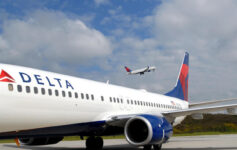United Airlines is facing another firestorm over news that a 90-year-old Pearl Harbor veteran bound for Honolulu was among 41 passengers bumped when bad weather necessitated severally weight restricting a 737-800 aircraft at Los Angeles International Airport.
Ewalt Shatz travels to Pearl Harbor each year to take part in commemorative ceremonies and this year his trip was book on United Airlines. But at the check-in counter, he was told bad weather enroute meant that many passengers could not be accommodated, including him. He was rebooked on American Airlines to Maui with a connection to Honolulu on Hawaiian–he made it to Honolulu, but several hours late.
Word got out on Twitter and the issue quickly went viral.Upon arrival he was greeted with 13 leis and by over 70 people. Videos here and here.
United issued the following statement-
Inclement weather in the path of United flight 1226 required the flight to carry additional fuel and, as a result, reduce the number of passengers on board by 41. United agents in Los Angeles rebooked those customers, including Mr. Shatz, on the best available alternate flights on United and other airlines. We look forward to speaking with Mr. Shatz and the other affected customers.
Invoking the playbook of Vice President Joe Biden, Shatz stated, “I think it’s all a bunch of malarkey. They make it sound nice but it wasn’t that nice. They weren’t concerned about me or anything else.”
Does employee attitude makes all the difference? Perhaps no explanation or alternate arrangement would have satisfied Shatz, but the whole “Friendly Skies” campaign just crumbles, even if we concede–and I will defend United here–that United handled the issue as best it could. It still got Shatz to Honolulu on Wednesday, a full three days before his event. United was faced with an impossible situation and did what it had to do–endangering the safety of the flight for one more passenger, even a decorated WWII hereo, was not option.
But the issue here is not really Shatz, but about how United determines who to bump off a flight when it cannot get enough volunteers.
United’s Customer Commitment states-
Occasionally we may not be able to provide you with a seat on a specific flight, even if you hold a ticket and have checked in on time and comply with other requirements. This is called an oversale, and occurs when restrictions apply to operating a particular flight safely (such as aircraft weight limits); when we have to substitute a smaller aircraft in place of a larger aircraft that was originally scheduled; or if more customers have checked in and are prepared to board than we have available seats.
If your flight is in an oversale situation, you will not be denied a seat until we first ask for volunteers willing to give up their confirmed seats. If there are not enough volunteers, we will deny boarding to passengers in accordance with our written policy on boarding priority. If you are involuntarily denied boarding and have complied with our check-in and other applicable rules, we will give you a written statement that describes your rights and explains how we determine boarding priority for an oversold flight. You will generally be entitled to compensation and transportation on an alternate flight.
We make complete rules for the payment of compensation, as well as our policy about boarding priorities, available at airports we serve. We will follow these rules to ensure you are treated fairly. Please be aware that you may be denied boarding without compensation if you do not check in on time or do not meet certain other requirements, or if we offer you alternative transportation that is planned to arrive at your destination or first stop-over no later than one hour after the planned arrival time of your original flight.
Just what is that written policy? We turn to the Contract of Carriage—
RULE 25 DENIED BOARDING COMPENSATION
…
2) Boarding Priorities – If a flight is Oversold, no one may be denied boarding against his/her will until UA or other carrier personnel first ask for volunteers who will give up their reservations willingly in exchange for compensation as determined by UA. If there are not enough volunteers, other Passengers may be denied boarding involuntarily in accordance with UA’s boarding priority:a) Passengers who are Qualified Individuals with Disabilities, unaccompanied minors under the age of 18 years, or minors between the ages of 12 and 17 who use the unaccompanied minor service, will be the last to be involuntarily denied boarding if it is determined by UA that such denial would constitute a hardship.
b) The priority of all other confirmed passengers may be determined based on a passenger’s fare class, itinerary, status of frequent flyer program membership, and the time in which the passenger presents him/herself for check-in without advanced seat assignment.
Put another way, the policy is that United can do whatever it wants, as long as it makes a token attempt to solicit volunteers first. And that makes sense–it is all the DOT requires and why would United want to limit its options?
In practice, reverse check-in time and whether a seat is assigned are the two greatest factors–I have witnessed this on repeated occasions. After all, it is easier to bump someone who never had a seat assigned than one who has a boarding pass in hand for a specific seat.
But tell that to Shatz and the other people, typically in an older demographic, who still check-in at airports rather than online. They get hosed in nearly every IDB event. Telling a 90-year-old that he has to switch terminals and wait six hours for the next flight is just sad, but is there a better solution?
The thing is, everyone has a story–U.S. culture rightfully esteems veterans, thus this story has gained a great deal of attention–but what about the other passengers who lost their seats? I would have been happy to give up my seat for Mr. Shatz…unless I was on my way to Hawaii to attend a wedding…or funeral…or important meeting…or to take a final exam.
Knowing that DOT rules mandate a payout of up to $1300 cash for involuntarily bumping a passengers off a flight, I hope that United did not foist its usual paltry $150 compensation offer before giving up and pulling passengers off against their will. People tend to be reasonable and also tend to know a good deal when they see one. Understanding that so many travel vouchers are never redeemed, I suspect United could have whittled down the number of IDBs with offers of vouchers, say in the amount of $2,000 along with an earnest plea that some truly needed to make the flight who faced the door being shut without them onboard.
But if an airline still cannot get volunteers after a generous voucher offer, then using a systematic and emotionless method to remove passengers makes sense. Gate agents and supervisors all have prejudices and to play on such tendencies by empowering agents to make exceptions is asking for trouble. I will never say that exceptions cannot be made, but leaving bump decisions to the whims of each employee means that passengers cannot predict what will happen if their flight is oversold, they can only practice making their story sound the most convincing.
Say Shatz found a sympathetic gate agent who squeezed him on the flight at the expense of another passenger. Say that other passengers was a woman who would now miss her own bridal shower or a man who gets one weekend a year to spend with his children will now have one less day?
I am not a fan of bright-line rules, but in the case of of IDBs, I would employ the following metric for bumping off non-status passengers: fare paid. Period.
“Ladies and gents, I am so sorry to do this, but unless more of you volunteer to give up your seats, I am going to have to start at the bottom and work my way up the list to remove passengers from this flight. Those without loyalty status who paid the least for their flight will be bumped first.”
Does this target bargain hunters and those who are able to plan trips further in advance and lock in better pricing? Certainly. But it is a reasonable, logical, and arguably the fairest way to resolve these type of situations.
I feel sorry for Mr. Shatz that he wasted half a day sitting at LAX–I wish I was there to take him into the Admiral’s Club and upgrade him to first class–but at least he made it to Hawaii three days before the big event. I feel more sorry for the many who may have missed something they will never be able to make-up for.
Weather problems and other situations necessitating bumps are a reality of air travel. In exercising discretion in how to deal with these situations, airlines like United should make it a point to point out how passengers will be removed from a flight and then do so in a systematic fashion, with empathy and a willingness to go the extra miles for each passengers to find alternate ways to get them to their final destination. That is flyer friendly.




Well presented. Having logical and reasonable ( and reasonably explained)rules can eliminate much of the negative emotional venting when denied seating. It also applies to other aircraft situations such as choice of food, upgrades, boarding, etc.
Apparently airlines look to obfuscation in tariff filings for its apparent flexibility for them in interpreting resolution, but being in the dark creates paranoia and resentment, both of which are more difficult to eliminate after they occur.
On behalf of the retirees of Legacy United Airlines, I want to apologize to this veteran. Shame on the “New United” for treating him the way they did. Shame on the “New United” for flying 737s to Honolulu. We need to get rid of Smisuck and his management team that is ruining a once great airline.
Matthew, by no means am I a United apologist, but are you sure their Customer Commitment applies here? This technically wasn’t an oversell situation.
SAN Greg, you are not exactly correct. IBD rules apply even for “weight and balance” rules for non-RJs. UAL can kick folks off (and keep cargo, which I am sure they did…) but they have to pay IBD compensation. So the IBD rules apply.
And if UAL choses to run sub-optimal aircraft to Hawaii (like they run them transcon now at times) then this happens. The old UAL never ran anything smaller than a 757 to hawaii, and since that is a much more capable plane these things did not happen.
Its a “change you will like.” Moreover, I have no doubt that UAL did its usual cheap “how about a $250 voucher” then started bumping folks. They were probably also oversold to boot.
Regardless, its an example of the “unfriendly skies” of AirHouston.
United has become a pro at what I call Cut and Paste PR. Just posting the same BS statement over and over all over the net is not helping.
UA running aircraft that “just” make it is a key issue.
Someone should buy the poor people working in the UA PR department a very long strong rope.
If there was one person who should NOT have been bumped it was that man. Who knows, if not for him that airline might not have had any flights there. (And, yes, I know not him singularly, but as one of many Americans who fought). I’m becoming really disgusted with the lack of patriotism and appreciation for our Vets.
Going by fare paid will still seem capricious, since people don’t know what they paid compared to other people. Does the average passenger know that he/she got a great deal or a terrible one? I doubt it.
And I would think that a lot of those people who paid less, bought extremely early. Those are the sort of people who fly once a year, maybe planned their limited vacation days around those flights or the “great price” that they may have [thought] they found. Kicking them off is mean bordering on unethical.
Can you imagine the backroom dealing that would create, too? Those who could afford it could pull, “I’m going to get bumped off this flight. Sell me a Y-class ticket so the person who can’t pay more gets bumped instead.”
Either way, this is an economically regressive, ultra-capitalist way of determining which of your passengers gets the privilege of being massively inconvenienced. It’s exactly the sort of thinking about passengers as revenue machines that is pushing UA toward becoming a joke airline a la Spirit.
How about this instead – no one is IDBed, ever. The airline messed up and oversold the flight, so it is the airline’s job to ramp up the compensation until they get enough volunteers, or switch aircraft to something that can handle it. Passengers should never be published for an airline’s mistake, and certainly not those who may be the least able to afford missing their flights.
@Chris–you make a strong and persuasive argument.
But in a world in which carriers can get away with IDBs, isn’t a systematic approach better than a highly arbitrary one? What basis would you use, assuming IDBs will (can) continue and carriers won’t up the offers on VDBs to astronomical levels?
@Pam: appreciation?
I wouldn’t classify Matt’s position to be “fair” so much as reasonable. It’s not necessarily “fair” in life that some are wealthy or have status and others who are just as deserving customers who booked their tickets in advance for a planned vacation at a lower fare should be bumped off. But it’s reasonable and understandable. First and business class passengers are not getting bumped due to fuel weight. In addition, angrily bumped first and business class passengers, especially those with blogs, will probably make more trouble than an economy passenger.
The proper policy is to offer decent vouchers and business class upgrades for later flights to get more than enough volunteers. In other words, transform bumped economy passengers into business class passengers. Win-win.
I just want to emphasize what has already been mentioned. By focusing on the rules being used, the blog is utterly missing the bigger picture. United is running vastly inferior planes.
757s can have full passengers and full gas and takeoff. You don’t bump passengers off of 757s. The new 737s at United have almost the same number of seats, but you have a choice: Fill ‘er up with gas or fill ‘er up with people, but you can’t do both.
Who runs an airline with planes that can’t carry the passengers after you sold them a ticket!!!!!! Seriously would any business person ever consider such a plan . . .
Hey Fred let’s start an airline, but let’s use planes that allow us to sell 200 tickets even though we can only carry 150 people in reality.
Yeah that’s the ticket. Gonna be a GREAT airline!